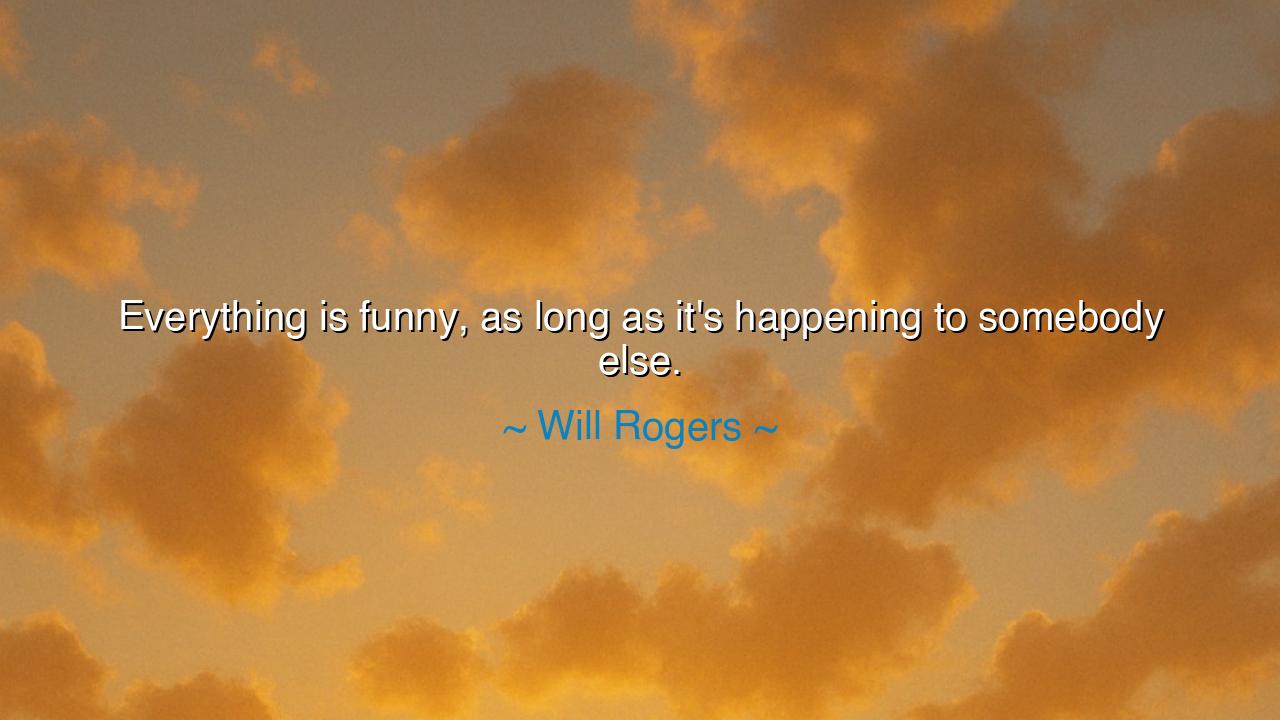
Everything is funny, as long as it's happening to somebody else.






“Everything is funny, as long as it’s happening to somebody else.” – Will Rogers
There is a deep and enduring truth hidden beneath the humor of Will Rogers’ words. At first, the quote seems light, even playful — a wink at human folly — but like all great wisdom, it cuts both ways. Rogers, who was both a comedian and philosopher of the common man, saw clearly into the heart of human nature. We are quick to laugh at the missteps of others, yet we bristle when the same hand of fate turns toward us. In this single line, “Everything is funny, as long as it’s happening to somebody else,” he captures the dual nature of laughter — both its light and its shadow — and calls us to examine the line between amusement and empathy.
To laugh at the suffering of others is one of the oldest instincts in mankind. In the marketplaces of ancient Athens, the people would gather to watch comedic plays that mocked the powerful, the foolish, and even their own neighbors. They laughed not only out of joy but out of recognition — for in the failings of others, they saw reflections of themselves. Yet when misfortune struck their own homes, laughter vanished, and sympathy replaced it. Thus, humor has always been the mirror through which we confront what is uncomfortable — but it is easier to gaze at that mirror when it shows another face. Rogers, in his gentle wit, reminds us that laughter can reveal truth, but it must also awaken compassion.
In his time, Will Rogers was known not for cruelty, but for clarity. He was a man of the people, a cowboy philosopher whose humor carried the weight of kindness. When he spoke these words, he was not mocking human hypocrisy — he was illuminating it. He had lived among all walks of life: presidents and farmers, actors and soldiers. He had seen how men could laugh at another’s trouble to ease their own insecurity. And he understood that such laughter, while natural, must grow into something wiser — into understanding. For laughter without empathy is empty; it is a hollow sound that fades quickly.
Consider the ancient story of Diogenes the Cynic, the philosopher who mocked the vanity of Athens by living in a barrel. He laughed at the powerful, at the rich, at the pompous — and they, in turn, laughed at him, thinking him mad. But when he spoke of freedom, when he pointed out the absurdity of human pride, their laughter grew uneasy. For in mocking others, he revealed the hypocrisy of all men. His life was a living joke — but one that burned with truth. Like Rogers, Diogenes showed that comedy can both entertain and expose, but the greatest laughter is that which brings understanding, not scorn.
The quote also speaks to the fragility of human empathy. It is easy to laugh when the storm is far away, when the roof that leaks belongs to another. Yet true wisdom lies in remembering that every man will, at some time, stand in the rain. Rogers reminds us that the boundary between “somebody else” and “me” is thin and ever-shifting. To laugh kindly at another’s hardship is to acknowledge that we too are human, that we too will stumble. But to laugh cruelly is to forget that life’s wheel turns for all. The wise, therefore, temper their laughter with humility, knowing that tomorrow’s jest may become today’s lesson.
In the realm of storytelling and art, this truth has long been echoed. Shakespeare’s fools, for instance, were never mere jesters; they spoke truth wrapped in laughter. When they mocked kings and courtiers, audiences laughed because the ridicule fell upon others — but deep down, they recognized themselves. The fool’s wisdom lay in exposing universal folly without hatred. This is the spirit that Rogers carried — the art of laughing with, not at. To him, humor was not a weapon, but a bridge: a way to unite the proud and the humble, to remind humanity of its shared absurdity.
And so, what lesson should we, the inheritors of this wisdom, carry in our hearts? It is this: laugh, but do not forget compassion. Find humor in the world’s chaos, but let your laughter be gentle. When others fall, do not mock them from a distance — reach out your hand, even as you smile. Learn to laugh at yourself, for that is the highest form of freedom. When we see the comedy in our own struggles, we rise above them; when we laugh only at others, we fall deeper into pride.
Thus, the words of Will Rogers are both mirror and warning. They ask us to see laughter not as escape, but as enlightenment. To find the joy in life’s absurdity, yet never lose our humanity. For everything is funny — not because others suffer, but because we all do. And when we recognize that shared truth, laughter ceases to divide us and becomes what it was always meant to be: a song of mercy in the face of life’s great and unpredictable play.






AAdministratorAdministrator
Welcome, honored guests. Please leave a comment, we will respond soon